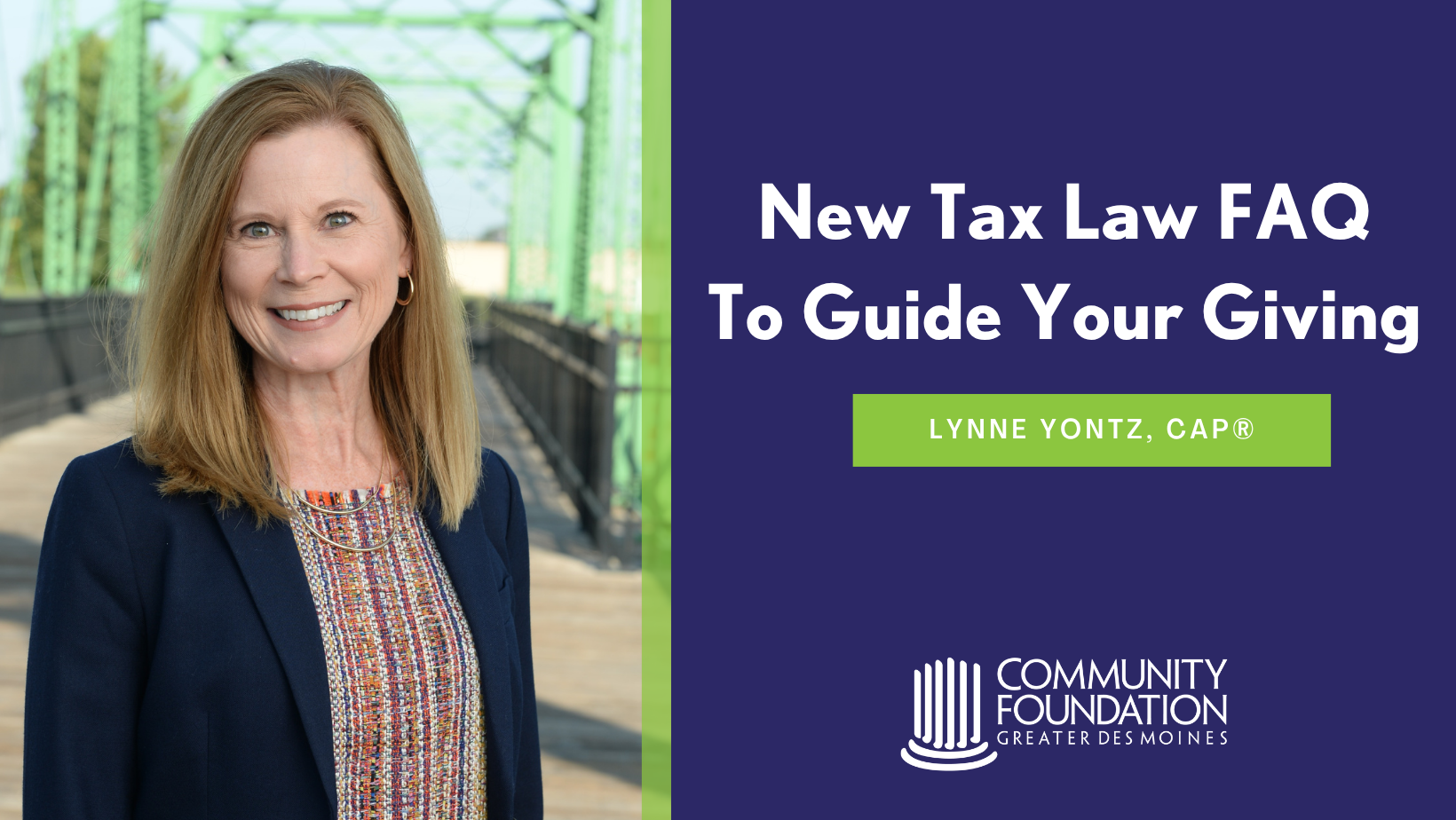New Tax Law FAQ To Guide Your Giving
Oct 14, 2025

It’s more important than ever to stay informed about how changes in the tax law may affect your charitable giving. The new federal legislation signed on July 4, 2025, creates challenges, as well as opportunities, for structuring your philanthropy. We encourage you to reach out to your attorney, CPA and financial advisor to evaluate how the changes in the new tax law may impact your own situation.
To help you along this journey, we’ve provided the checklist below of FAQs to discuss with your advisors.
What is happening with the standard deduction?
The new law extends the higher standard deduction. For 2025, it’s $15,750 for single filers and $31,500 for married couples filing jointly. It will be indexed for inflation in years ahead. The higher standard deduction will likely impact tax-motivated charitable giving, even with the expected uptick in the number of itemizers, thanks to the new state and local tax deduction allowances. There are important exceptions and nuances to consider, which you’ll want to discuss with your advisors. For example, if you are 65 or older, you’re eligible to receive an additional $6,000 “bonus” deduction—but it begins to phase out if your modified adjusted gross income exceeds $75,000.
Is bunching right for me?
Based on the increases to the standard deduction, you may want to talk with your tax advisors about bunching charitable gifts for 2025 using a donor advised fund at the Community Foundation. Through this technique, you can make several years’ worth of charitable contributions in a single year to exceed the standard deduction threshold, thereby maximizing tax benefits in that year. Over the following years, your donor advised fund can distribute grants to charities over time, according to your wishes. You can learn more here about bunching.
Why is bunching such a 2025 buzzword?
There are more reasons you might want to talk with your advisors about front-loading charitable contributions in 2025. In 2026, a new provision takes effect that allows you to take a deduction for charitable gifts, only to the extent that your giving exceeds 0.5% of your adjusted gross income. What’s more, if you’re in the highest tax bracket, 37%, you can still only deduct charitable contributions at the 35% rate.
What is this $1,000/$2,000 deduction I keep hearing about?
If you don’t itemize your deductions, you’ll be glad to know that starting in the 2026 tax year you can claim a deduction for cash gifts to qualifying public charities—up to $1,000 for single filers and $2,000 for married couples filing jointly.
What’s the “fine print” on this new deduction?
Excluded from this new provision are gifts to donor advised funds and non‑cash gifts, which is unfortunate because those vehicles are popular, convenient and tax-effective.
If I itemize deductions, why do I care about the $1,000/$2,000 deduction?
If you’re encouraging your adult children to get involved in philanthropy, make sure they are aware of this new deduction. It could be particularly helpful for young people because many young people do not yet itemize.
If I am over 70 ½, can I still do a Qualified Charitable Distribution?
Yes! A Qualified Charitable Distribution (QCD) enables individuals aged 70 ½ or older to donate up to $108,000 per year (as of 2025) directly from an IRA to eligible charities, and in the process exclude the donated amount from taxable income altogether–rather than relying on an itemized deduction. QCDs may be especially advantageous because they provide a direct tax benefit, regardless of whether you itemize or take the standard deduction. Using a QCD to fulfill required minimum distributions (RMDs) can lower your adjusted gross income, potentially reducing taxes on Social Security income and Medicare surtaxes, and helping you sidestep the new floors and caps on itemized charitable deductions imposed by the new tax law starting in 2026.
You could also consider directing your QCD, also known as an IRA Rollover, to an agency or designated endowment at the Community Foundation for one of your favorite nonprofit organizations. The Community Foundation hosts nearly 1,000 endowments supporting a variety of nonprofit organizations in Greater Des Moines and across the state.
How can the Community Foundation help?
The Community Foundation of Greater Des Moines is happy to collaborate with you and your professional advisors as you explore ways to achieve your charitable giving goals under the new laws. Contact our team today. We look forward to hearing from you!